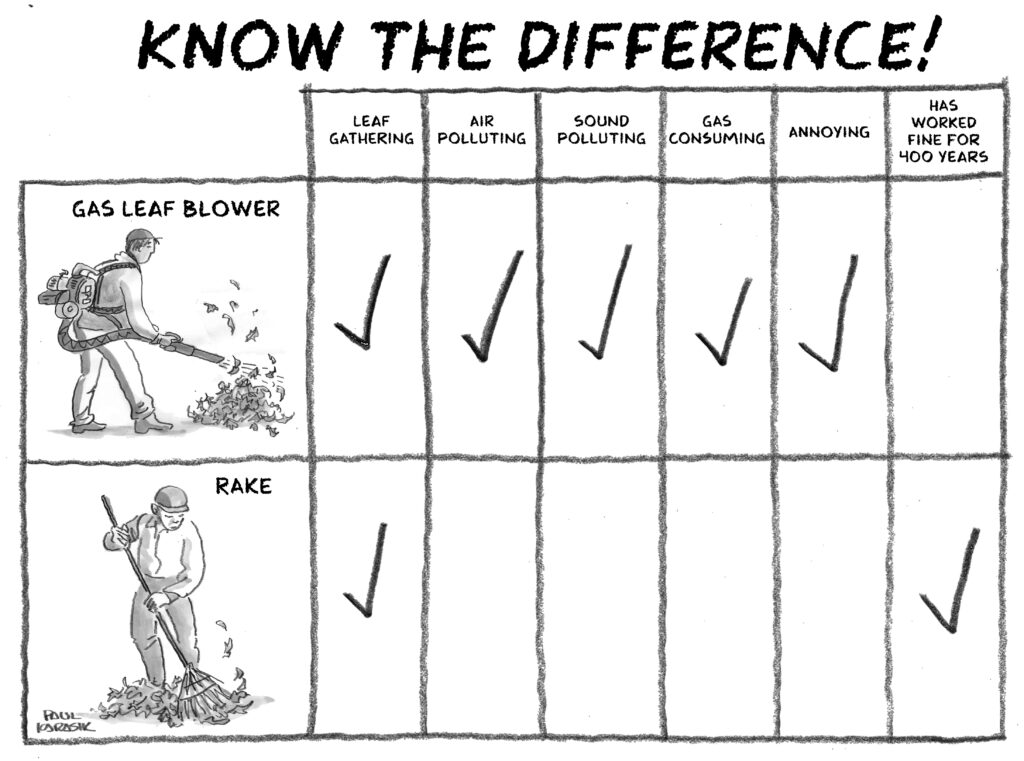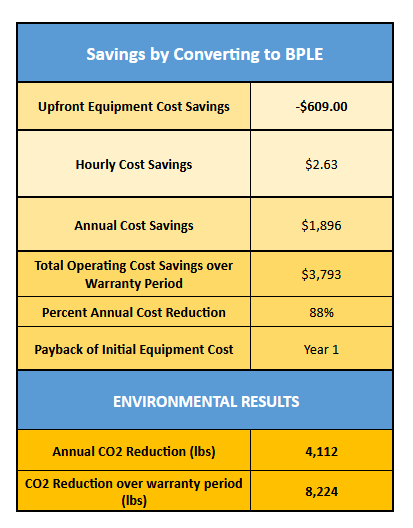Leaf Blower Regulation

In 2025, voters across the Island sent a clear message in support of cleaner air and reduced carbon emissions – along with preserving some measure of peace and quiet – when they approved at Town Meeting new regulations to address the problems caused by the increasingly excessive use of leaf blowers. Gas powered blowers are particularly harmful, generating noise that causes hearing loss, raises stress levels, and interferes with the ability to work, study, and rest effectively. They also emit shockingly high levels of air pollution: according to one study, common leaf blower models emitted four times the nitrogen oxides, 20 times the carbon monoxide, and 36 to 300 times the hydrocarbons as a Ford F-150 Raptor – the 6,200 pound, 411 horsepower “street-legal” version of an off-road racing truck. The health impacts of that pollution fall most heavily on children, the elderly, those with preexisting respiratory conditions, and especially the landscaping workers who use the equipment all day long.
A year before, a group of concerned citizens began work with VCS to develop language for a bylaw that would set limits on when (time, day, and season) leaf blowers could be used, and that would also phase out gas powered blowers entirely after three years, in favor of quieter and much less polluting electric alternatives. Following a campaign this winter and spring, which included numerous public info sessions and outreach to landscaping professionals and business owners, the bylaw was brought to Town Meeting this April in five towns. (It didn’t make it onto the warrant in time in Aquinnah, but we are optimistic it will pass when it does.) On the Vineyard’s “Super Tuesday” night, the measure passed in Edgartown and West Tisbury by very large margins (with no significant changes), and in Oak Bluffs by a narrow margin after being amended to allow homeowners to use leaf blowers on their own property on Sundays (all Sunday use was prohibited by the original version). Three weeks later, the bylaw passed unanimously in Chilmark and by an overwhelming margin in Tisbury, although in both cases with significant changes. Chilmark voters amended the bylaw to exempt homeowners from all restrictions (meaning it only applies to commercial operators), while in Tisbury the article was altered by the town Select Board to remove all limits (time, season, etc) on use of electric blowers.
All told, the results represent a significant win for the environment and a meaningful improvement in quality of life for the Island. Thank you, voters!
Bylaw Text: Chilmark | Edgartown | Oak Bluffs | Tisbury | West Tisbury
Skip to: Bylaw Regs | Electric Equipment | The Issues | Further Reading
*** Leia em Português ***
Why Should We Regulate Leaf Blowers?
Noise: The noise from leaf blowers is more than just a nuisance. It impacts our health, both physical and mental. It causes hearing loss, raises stress levels, and interferes with our ability to work and our children’s ability to study. Gas-powered leaf blowers in particular are excessively loud, generating noise levels over 100 decibels at the ear of the operator and 65 to 80 decibels at 50 feet away. Even at 800 feet away, the noise exceeds 55 dB, the World Health Organization standard for community noise exposure. Notably, the decibel scale is logarithmic: every ten dB increase corresponds to an approximate doubling of loudness as perceived by humans. Further, standard dB measures underestimate the effects of leaf blower noise as compared to similarly loud noises, because their powerful low frequency component is better able to travel great distances and penetrate walls, intruding into indoor spaces.
Air Pollution: Gas leaf blowers also spew out a shocking amount of air pollution – far more than even the largest of vehicles. In one study, common leaf blower models generated about four times the nitrogen oxides, 20X the carbon monoxide, and 36 to 300X the hydrocarbons as a 6,200 pound, 411 horsepower Ford F-150 Raptor. These toxic chemicals (along with high particulate emissions) exacerbate asthma and other respiratory ailments, cause headache, dizziness, and nausea, and are associated with a wide variety of serious health effects from neurological problems to stroke, arrhythmia, and heart failure, to lymphoma, leukemia, and other cancers. These impacts are even more serious in children, the elderly, and people with preexisting conditions, and are felt especially acutely by operators.
Climate Change: In addition to their toxic emissions, the small gas engines used in lawn care equipment are simply inefficient. All small gas engines (2-stroke and 4-stroke) use more energy than comparable electric motors, partly because they are always burning fuel, even at idle, while an electric motor applies power only as needed. Two-stroke engines that burn a mix of gas and oil are especially wasteful (and polluting). It all adds up to the fact that leaf blowers are contributing far more than their share to the Vineyard’s carbon footprint – all while our island is working hard to transition away from fossil fuels.
Harm to Soil & Ecosystems: Leaf blowers blow away not only the leaves, but all sorts of other organic matter needed for healthy soil — and they just blow away a lot of the soil, too. When mulch and other protective cover is gone, it unnecessarily exposes plants to pathogens and diseases, which in turn increases the use of toxic pesticides and fungicides. Blowers disturb and even displace the beneficial insects and other critters that are vital parts of healthy gardens and natural ecosystems.
Why ban gasoline-powered leaf blowers but not electric?
The short answer is that gas powered blowers are much more harmful than electrics, especially with regard to noise and air pollution, as described above.
“Consider that countless organisms live in leaf litter … among them Luna moths, Mourning cloak butterflies, and roughly 140 of Martha’s Vineyard’s native bee species, which all require leaf litter to survive the winter. The whir of a leaf blower engine is a death knell to all of them, breaking the chain in the organic cycle that perpetuates a living ecosystem. (Read the rest here)
— Rich Couse, BiodiversityWorks
How Would this Bylaw Work?
What are the proposed regulations?
- Time of day and day of the week restrictions on when leaf blowers (of any type) may be used
- Seasonal limits on when gas-powered leaf blowers may be used
- After 3 years, gas-powered leaf blowers are prohibited year-round
Who does it apply to?
Everyone – professional landscapers as well as homeowners/residents, with certain exceptions for Town-related activity.
What are the exceptions?
Towns are exempted from the restrictions when working to remediate impacts of severe weather events and accidents.
How will it be enforced? What are the penalties for violations?
This is one area where there are small differences among the towns. In general, enforcement may be assigned to the Police or Board of Health, and penalties range from warnings to fines (usually starting at $100 and escalating to no more than $300).
Are all leaf blowers subject to the bylaw? Why or why not?
All leaf blowers, whether electric and gas powered, will only be allowed to operate between 8:00 AM and 5:00 PM Monday-Friday, with stricter limits on weekends. (Weekend days/hours are an area where the bylaw may differ across towns.) Gas-powered leaf blowers will be allowed only for the fall and spring clean-up seasons, Oct. 15 – Jan. 15 and March 15 – May 31. There is no seasonal restriction on electric leaf blowers.
Why are there time-of-year restrictions for gas, but not electric, leaf blowers?
Gas-powered leaf blowers will be allowed for Fall and Spring clean-up for the first three years following passage of the bylaw. This phase-in period is to allow landscapers and homeowners a realistic time frame to fully transition to electric equipment. Allowing the use of electric blowers year-round provides an incentive to begin investing sooner than three years, encouraging a quicker transition.
Why is there a three-year delay before gas-powered leaf blowers are banned?
Based on discussions with our local landscaping community, and examples set by other towns across the country, we have determined that a transition period of three years is appropriate to ensure the bylaw is fair and feasible for everyone. While electric equipment is very cost effective in the long run, the upfront investment can be significant.
Why isn’t other landscaping equipment (lawnmowers, chainsaws, etc) included in the bylaw?
We absolutely hope that the change to electric leaf blowers will inspire a broader shift toward electric equipment, which has become much more powerful and cost effective and continues to improve. However, the noise pollution created by leaf blowers is a much more constant and widespread problem across the Island, more so than other types of landscaping equipment.
“We started our quest towards going all-electric for our landscape maintenance department in 2019 … considering battery usage, electric equipment costs more upfront. Despite the high initial costs, over the course of two seasons, it will eventually pay off as you will not have to pay for fuel for the electric blowers, and they require very little – if any maintenance.
Our clients and neighbors appreciate the quiet of the electric equipment we use during summer. It was a learning curve, but our employees are also happy with the electric blowers.” (Read the rest here)
— Jesse Fuller, Fullers Landscaping
Making the Switch to Electric
What electric equipment options are available? Are they as good as gas-powered?
Electric equipment has come a long way in recent years and continues to improve, with power that rivals gas models and better reliability. The cost of batteries and recharging time are the primary challenges remaining, but many professionals have found ways to use and charge the equipment strategically and efficiently.
For a start, check out this comparison of gas and electric models; for even more info and background on going electric, check out product information and more from American Green Zone Alliance.
Are there resources available to help with purchasing electric equipment?
Yes! Mass Save offers rebates for both retail-grade ($30) and professional-grade ($100) leaf blowers, as well as similar rebates for mowers, trimmers, and chain saws. Click here to learn more. (Must be a customer of Eversource, Cape Light Compact, National Grid, or Unitil.)
How much will investing in an electric leaf blower save me over time? How long before the initial cost is paid off?
You can calculate and compare your savings using the Equipment calculator HERE. Simply download the excel sheet and follow the instructions on the first tab. The calculator produces numbers for annual costs, savings, and the long-run payoff period. (Click image for example comparison of gas powered vs. electric powered blowers.)
What about battery recycling?
Recycling lithium-ion batteries at the end of their lives is a more sustainable approach than disposal. Approximately 95 percent of a lithium-ion battery can be recycled into new batteries, conserving critical minerals and other valuable materials. The metals used, such as lithium, nickel, and cobalt, hold their value beyond the life of the battery, allowing recycling facilities to reclaim these materials for use in new batteries or other equipment. All electric blower batteries can be recycled for free by Call2Recycle. The closest Call2Recycle drop-off location is at Staples in Falmouth, or you can ship them – check the website for instructions.
Do lithium-ion batteries pose a fire risk?
Independent studies and fire department recommendations agree that lithium batteries are safe when used properly; however, they can pose a fire risk if damaged, overheated, or improperly charged or stored. (In addition, proper storage will prolong battery life, so this just makes financial sense.) Importantly, this applies to all lithium batteries, which are commonly found today in products ranging from cell phones to golf carts. Read about proper battery storage here.
“As conscientious stewards of our island community, this transition is both necessary and inevitable. However, implementation needs to be gradual and calculated, taking into account several key considerations.” (Read the rest here)
— Ryan J. White, The Avant Gardener

“Among the biggest frustrations, beyond the noise and the fumes, is that so many “billable hours” are spent using this equipment just to fill an estimated hourly seasonal contract. Regardless of the time of the season, I have witnessed them blowing leaves or nothing at all, in or out of beds, on and off a lawn, across a patio, around a pool – blasting dust, grass clippings, or minimal amounts of vegetation just to keep things “tidy” … what a practical handheld rake or broom could do quietly and efficiently.” (Read the rest here)
— Jennie Slossberg, Garden Angels
Read more testimonials from local landscapers
Still Not Convinced? Keep Reading!
Are gas-powered leaf blowers really so bad for the environment?
By modern environmental standards, gas-powered leaf blowers really do stick out as an anomaly. While car and truck engines have been getting dramatically cleaner and more efficient for decades, most leaf blowers still use dirty, wasteful, and highly polluting 2-stroke engines that haven’t improved at all. Compared to other tools, leaf blowers are often used for long periods of time, and/or with multiple units operating in one location. In addition to the impact of air and noise pollution, excessive blowing removes topsoil, beneficial organisms, and disturbs wildlife.
But, does lawn equipment really matter in the grand scheme of things?
Yes. Lawn and landscape care in the USA contributes a surprisingly large amount to total air pollution. Two striking examples:
- Operating a typical two-stroke leaf blower for 30 minutes puts out as much air pollution as driving a modern Ford F-150 pickup for 3,800 miles.
- Based on data from the EPA, in 2020 the nation’s landscaping equipment collectively contributed as much smog-forming nitrogen oxides as 30 million cars.
Is the electricity used for charging batteries really “clean energy”?
All energy generation comes with environmental costs, but electricity is much cleaner than gasoline, especially in our market. Massachusetts law requires utilities to provide electricity generated with 63.5% clean energy by 2025, and 81% by 2030. According to Eversource, the actual number is currently 76%. Other factors (fuel spillage, motor efficiency, transportation losses, etc.) further increase the benefit of going electric.
What about the health effects? Who is most at risk?
First and foremost, the people most exposed to the health effects – hearing loss, respiratory illness, and a litany of other ailments exacerbated by air pollution – are the operators themselves. They are exposed for the longest amount of time, and at the closest distance – by far – from the source.
Second, people with preexisting conditions, the elderly, and especially children are at increased risk. One compelling description can be found in a joint letter from Mt. Sinai Hospital’s Pediatric Environmental Health Unit, sent in support of a ban on gas-powered leaf blowers in New York:
… leaf blowers pose multiple hazards to human health. Children are the most susceptible members of our population to these hazards because they breathe more air per pound of body weight per day than adults … further magnified by the fact that they are passing through the stages of early development, and thus their lungs, ears, eyes, and other organ systems are inherently more sensitive to environmental hazards than the organs of adults. (Read the rest here).
Have other towns and cities regulated or banned leaf blowers?
Yes, and the list is ever growing. Close to home, Nantucket in 2020 prohibited commercial landscapers from using gas-powered blowers. Elsewhere in Massachusetts, eleven towns including Lexington, Concord, and Cambridge have voted to phase in year-round bans on gas-powered blowers, with many other towns banning them during the summer. More than 200 villages, towns, and cities across the country have as well, with perhaps the best-known examples being the cities of Los Angeles and Washington DC. Isn’t it time that our Island join in the movement for building a cleaner, quieter, and safer community?
Further Reading on Healthy Lawns & Gardens
- Testimony – Battery Electric is Profitable and Powerful Enough for Landscape Contractors
- American Society of Landscape Architects – Battery Powered Equipment Helps Us All Breathe and Hear Easier
- Electrify Now! – The Advantages of All-Electric Yard Care
- Healthy Yards
- SoilsAlive – How Leaf Blowers Destroy Soil
- Four Tips for a Climate Friendly Yard
- EcoBeneficial – Good Reasons to Stop Blowing Leaves
- Vineyard Conservation Society – Vineyard Lawns
- BiodiversityWorks – Natural Neighbors Program
- Total Landscape Care – Equipment Matters: the battle for battery
- Quartz – The Complete Guide to the Battery Revolution
- Landscape Management – Battery Boom: breaking down the benefits of battery-powered equipment
- Lawn and Landscape – Plugged In

